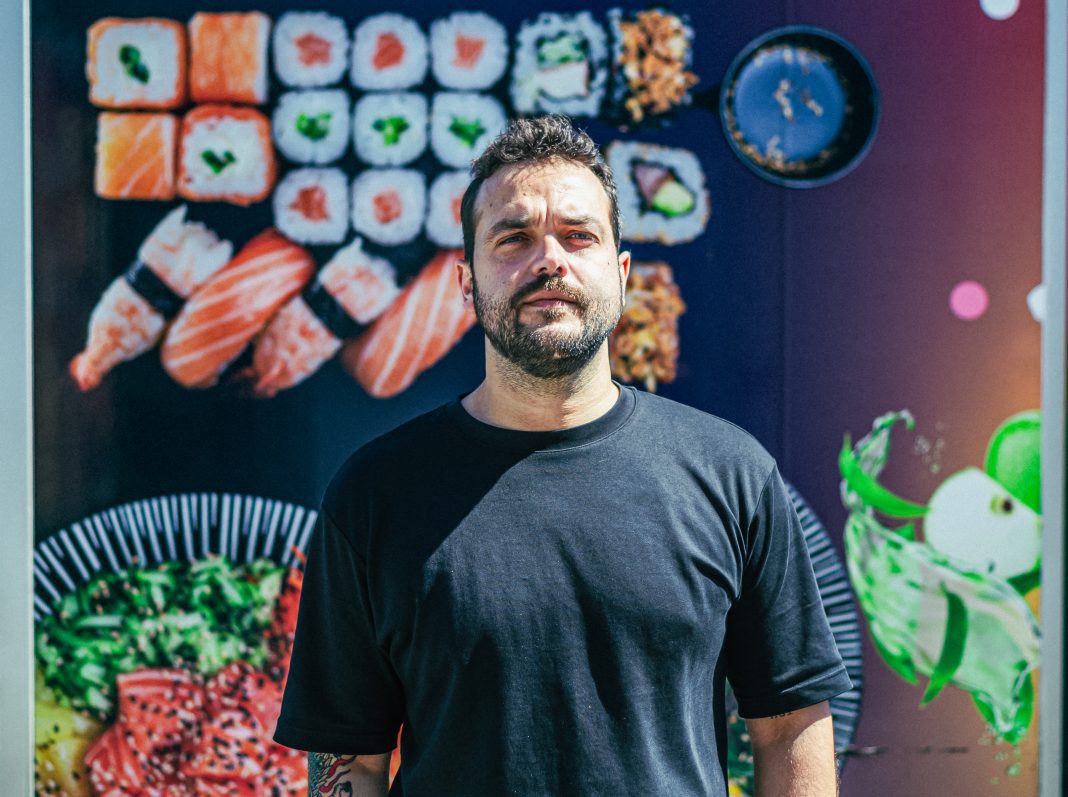It was a decision made during the health crisis that changed everything—almost a gamble. In 2020, facing halted sales, Alison Belnou suggested to one of his clients that they switch to consignment sales. He refused. Alison insisted: “Either we change the model, or we stop everything.”
A risky bet, but a winning one. Not only did the client accept, but, convinced, he opened his entire network to him. In one year, Sushi Fresh quadrupled its turnover. The brand is now present in over 300 stores in Luxembourg and Belgium. A turning point. Also a revelation: imposing and believing in one’s vision can be a powerful force.
An Entrepreneur Born
Founder of Sushi Fresh, Alison Belnou represents a generation of pragmatic entrepreneurs. Yet nothing in his background suggested he would produce sushi for large-scale retail. Son of fine-dining restaurateurs, he grew up in the family restaurant. “Service, taste, rigor—that’s in my DNA. But I didn’t want to be a chef. I wanted to create, build, and test.”
“I didn’t want to be a chef. I wanted to create, build, and test.”
When he discovered the Sushi Shop concept, he sensed the potential of a hybrid model: central production, ultra-fresh delivery, and restaurant-quality at accessible prices. In 2014, at 22, he launched Sushi & More, which would later become Sushi Fresh after the health crisis.
With a business plan in hand, he found an investor and built his network. Monoprix was the first to trust him, followed by Cactus Shoppi, Sodexo, Eurest, Santé Services, Pall Center, Delhaize, Carrefour, MyAuchan, Delitraiteur, Kinepolis in Luxembourg, and Carrefour, Delhaize, Intermarché, Okay, Louis Delhaize, Spar, Kinepolis, and Cora in Belgium. The latest to join is Colruyt, still in the testing phase.
Grow, Learn, Correct
Growth has been rapid but fraught with pitfalls. There were mistakes in locations, failed openings, and forced closures. “We believed in shopping malls. Bad bet. Too many expenses, too few time slots. But we learned.” Even more difficult was recruitment. “We hired hundreds of people. Few had the required rigor. Today, we have a solid core team, but it remains the number one challenge.”
With 90 employees, 35 references, and 4 fish deliveries per week, the system is running smoothly. Alison is everywhere, except in accounting. “I want to be able to say no to a client if necessary.” He values his independence, but also strives for ecological consistency.
Salmon, avocado, plastic. Three sensitive topics in the restaurant industry. “For salmon, we made a clear choice: Norwegian farms, large fish, strict traceability. It’s more expensive, but more responsible.” The same approach is applied to avocados: difficult to avoid but used responsibly. Whenever possible, they use cucumbers instead: “We work with non-calibrated cucumbers, often unsellable elsewhere.” Regarding sauces, the focus is on local and cleaner recipes: “We stopped importing from Asia; our sauces are produced in Belgium.”
The model continues to evolve. Northern France is the next step—a market with little competition, still to be explored. “I don’t want to become a franchise. I prefer to grow with our team, at our own pace.”
“I’m still addicted to the adrenaline of development.”
The Team Above All
His pride? The team. “I never imagined creating 90 jobs. That’s what drives me.” Long absorbed by his business, he is learning to balance his personal life. “I’m finally going on vacation—two or three weeks a year.” Supported by his partner and helped daily by Eliott, his right-hand man for nearly ten years, he can now ease up a bit. But not too much: “I’m still addicted to the adrenaline of development. As long as there are products to improve and ideas to test, I move forward.”
This article was published in the 5th edition of Forbes Luxembourg magazine.

